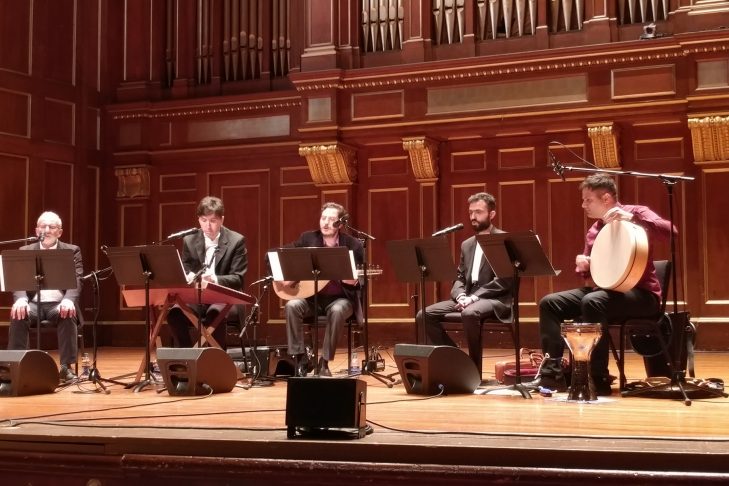From the mesmerizing mixture of flute and vocals, oud and percussion, a renowned orchestra transported its audience to the age of the Ottoman Empire while spotlighting a chapter of musical symbiosis.
In the concert “Jews and Sufis: Shared Musical Traditions” at Jordan Hall at New England Conservatory last Thursday, Dunya Ensemble performed music that reflected the historical coexistence of diverse groups in the Ottoman Empire. As explained in the performance and a pre-concert talk, this music dates back to the 16th century—before the tensions of later centuries led to war, persecution and the breakup of the empire into modern Turkey, where a Jewish population of 12,000 remains, the largest number of Jews in any Muslim nation, according to ethnomusicologist Joseph Alpar.
The concert and discussion emphasized the exchange of influences between Jews and Muslims, including Sufi mystics. For instance, the ensemble performed a set of “several well-known Sephardic songs along with Sufi songs, which have been adopted into Turkish secular music genres,” according to the program. “El Dio Alto” is a poem about the Sabbath in Ladino or Judeo-Spanish written by Abraham Toledo in the late 17th or early 18th century, while “Demedim me?” is a Sufi piece that became a Turkish 1970s rock hit by Cem Karaca, according to the program.
“In what is Istanbul today, and Constantinople [previously], there was an amazing cultural encounter between different traditions,” said Hebrew University musicology professor Edwin Seroussi, director of the university’s Jewish Music Research Centre. “Jews are part of this encounter.”
Seroussi said Jews in the Ottoman Empire were influenced by Turkish music, notably a technique called makam—“[making] music on the basis of musical modes, shared by Jews, Muslims and Christians,” used in “religious spaces,” as well as in “common grounds, the courts of the aristocracy, even in the court of the sultan.”
For Ottoman Jews, Seroussi said, this technique “developed into several directions,” two of which he outlined in the pre-concert discussion with Alpar.
Jews might engage “ready-made Turkish music” and “change the text to Hebrew,” Seroussi said. “Many manuscripts and Hebrew sacred poems from the Ottoman Empire have the name of a Turkish piece and Hebrew characters, and sometimes the name of Turkish composers … They were passed from generation to generation, in the name of the composers, and performed in the synagogue.” This led to a repertoire called maftirim, which the program described as “Hebrew devotional poetry (piyyutim) set to Ottoman/Turkish makam music for use in the synagogue.”
Another approach was “original compositions in a Turkish style by Jewish composers,” Seroussi said. “Some acquired proficiency in music to the level where they could compose not only for the Jewish community, but for at least two or three we know, for the sultan himself, in the palace of the sultan.”
Meanwhile, there was a thriving interplay between Jews and Sufis, including in makam and maftirim.
“Two Sufi lodges were close to the traditions of the Jewish community, which allowed a certain relationship with the Jewish community,” Seroussi said. One such lodge was the Mevlevi, whose dervish order is known as the “whirling dervishes” in the West, according to the program.
“There was an exchange of visits, with Jews [coming] to Sufi lodges, and Sufis coming to synagogues,” Seroussi said. “There was a relationship of borrowing. Of course, Jews borrowed some pieces from the Sufi repertoire.” But, he added, “Jewish performers never accepted what is [a Sufi] staple—dance. They would not dance in the synagogue, just sing songs.”
The concert reflected the complex sensations evoked by the music, from the stateliness of many maftirim to the catchiness of numerous Sufi pieces, including the refrain of “Demedim me?” Dunya Ensemble director Mehmet Ali Sanlikol impressed on vocals and oud, while Rudvan Aydinli played mesmerizing ney, or flute, music while also contributing a powerful vocal solo.
While the performance emphasized coexistence, the presenters noted there were tensions within the Ottoman Empire over the centuries. “I don’t want to idealize Jewish life in the Ottoman Empire, that it was all milk and honey,” Seroussi said. There are even disputes over the origins of makam. Sanlikol and Seroussi said that in addition to its prominence in Turkish history, makam can also be considered Greek music dating from the Byzantine Empire before its conquest by the Ottomans. “I think it’s more reasonable to say that makam is the shared musical language of the Near and Middle East,” Sanlikol said. “[People] take that language and use it for their own purpose.”
The Jewish traditions of makam and maftirim are at risk of disappearing, according to Alpar, who cited an Istanbul congregation weary of listening to a 15-minute performance of the Sabbath hymn “Lecha Dodi.”
“For many Turkish Jews, it is sometimes difficult to process an older style of music that is sometimes difficult to listen to, difficult to sing back to,” Alpar said. “Cantors are in a difficult position. Do they keep heritage alive at all costs? Or do they accommodate younger, and not-so-young, members of the community who would like to see some changes in the music and liturgy?”
“Today there are very few places where this music is performed,” Seroussi said. “The stage becomes a new venue for maintaining it.”
As last week’s performance showed, the power of makam music remains alive several hundred centuries later. Alpar is hopeful that it retains enough power to continue to be performed in the synagogues of its birthplace.
“Look beyond tradition for answers, bend tradition without breaking it,” he said. “From my experience as a researcher, that’s the overarching theme, bending tradition without breaking it.”



